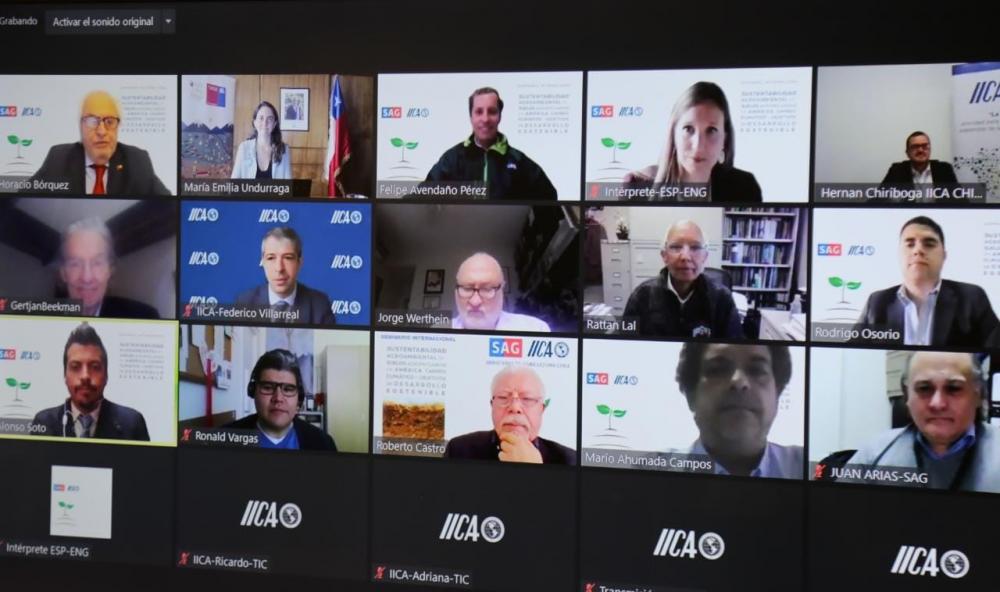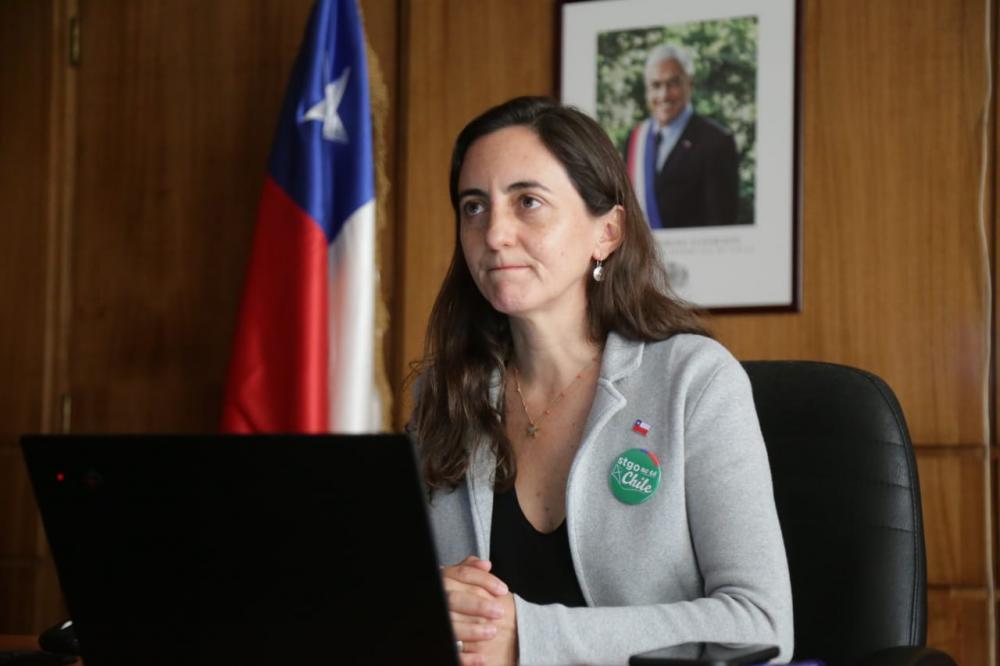Chile joins Living Soils of the Americas – an IICA–Rattan Lal soil restoration initiative

Santiago, 12 April 2021 (IICA). According to María Emilia Undurraga, the Chilean Minister of Agriculture, the country will participate in Living Soils of the Americas, an initiative spearheaded by the Inter-American Institute for Cooperation on Agriculture (IICA) and Rattan Lal, an award-winning scientist and the 2020 World Food Prize laureate.
Undurraga made the announcement during the international seminar, “Environmental Sustainability of Agricultural Soils in the Americas, Climate Change and Sustainable Development Goals”, which was organized by Chile’s Agricultural and Livestock Service (SAG) and IICA, featuring the participation of Rattan Lal, Director of the Ohio State University Carbon Management and Sequestration Center (CMASC), along with other international specialists.
Living Soils of the Americas seeks to build a bridge between science, public policy and soil restoration activities in the hemisphere, as soil degradation in Latin America and the Caribbean is endangering the region’s position as the world guarantor of food security.
Minister Undurraga stated that, “Let me say how interested Chile’s Ministry of Agriculture is in supporting the creation of local entities that have institutional linkages with the agricultural sector. Professor Lal’s experience will be important in this effort to create a bridge between science and public policies to enable the restoration of soil health and quality, and in turn, agricultural health. Therefore, we feel that the promotion of the Living Soils of the Americas initiative of IICA and CMASC is critical”.
Furthermore, the Minister remarked that, “Soil is a natural resource that constitutes the basis of the country’s overall development, providing ecosystem services that are not limited to production and that are evident in the rural world. I thank Professor Lal for helping to demonstrate soil’s importance in building a new paradigm to address climate change challenges – a paradigm that must develop a new approach to the creation of policies, programs and initiatives to assist in consolidating and strengthening institutional action at all levels of Chile’s agricultural, livestock and forestry sector”.
At the seminar, Rattan Lal delivered an entire presentation on soil conditions in Latin America and the Caribbean and the region’s challenges to achieve the 2030 Sustainable Development Goals (SDGs), such as engaging in nutrition-sensitive food production; improving water and air quality; incorporating the One Health concept, which interconnects animal, plant and human health; improving soil health; promoting urban agriculture; and increasing benefits to famers, by monetizing their sustainability efforts.
“As a matter of urgency, we must ensure that this concern about soil health stems from cities. Estimates indicate that 80% of the world’s people will live in urban areas by 2050. Thus, decisions should be taken about where and when to produce, drawing on the knowledge generated over the years about vertical crops or hydroponics”, said Lal.
“We must improve land management practices and incentives to transform agricultural systems into ecosystems that capture more carbon in the soils, paving the way for the adoption of the best methods for the management and development of public policies and regulations, with a view to restoring soil health and quality, which are tremendously important to the peace and institutional stability of countries and regions”, said Lal, who was ranked by PLOS Biology magazine as the world’s most influential scientist in the field of Agriculture and Agronomy.
With the Living Soils of the Americas initiative, launched at the end of 2020, IICA and CMASC are aiming to reinforce the Latin American and Caribbean region’s position as one of the world’s main food producing and exporting regions. Thus, it must improve soil quality, given that this is essential to increasing food and nutritional security in the planet. Nutrient-rich soils also help to mitigate the damaging effects of climate change.
The agro-environmental sustainability of soils
Rattan Lal, who is also an IICA Goodwill Ambassador, was one of the specialists invited by SAG and the Institute to speak and reflect on the agro-environmental sustainability of the agricultural soils of the Americas and the importance of this resource as a critical element in carbon sequestration. The international seminar brought together more than 600 experts from 22 countries in the hemisphere.
Federico Villareal, IICA’s Director of Technical Cooperation, said that, “We are extremely excited that Chile’s Ministry of Agriculture and the Institute are of one mind in terms of the goal of this seminar, which provides a sense of continuity and cooperation with respect to the Living Soils of the Americas initiative, using the best management approaches. Technical cooperation will work with governments, international organizations, universities, the private sector and civil society organizations to contribute to curbing land and agricultural degradation processes that are depleting the organic matter in soils – a fundamental natural resource for life on the planet”.

On the other hand, SAG’s National Director, Horacio Bórques, remarked that, “The Service’s role is to protect natural resources for agricultural production. This has assumed greater urgency nowadays, due to the impact of climate change, but we are also tackling soil degradation and water stress in our country. Thus, agriculture must incorporate new production practices, promoting a paradigm shift that aims for more sustainable agricultural development”.
The event also featured presentations by local representatives—Mario Ahumada and Rodrigo Osorio, from Chile’s SAG—and representatives from international agencies, such as Ronald Vargas, FAO’s Water and Land Officer and Secretary of the Global Soil Partnership (AMS), as well as Gertjan Berndt Beekman, from the IICA Brazil delegation, who related that country’s experience in the environmental management of the soil-water ratio.
Moreover, Jorge Etchevers, from the Mexican College of Postgraduate Studies, spoke of Mexico’s experience in environmental soil management and the challenges that climate change poses for this activity.
The complete seminar can be viewed here: https://fb.watch/4L6YCvlRIa/
More information:
Institutional Communication Division.
comunicacion.institucional@iica.int